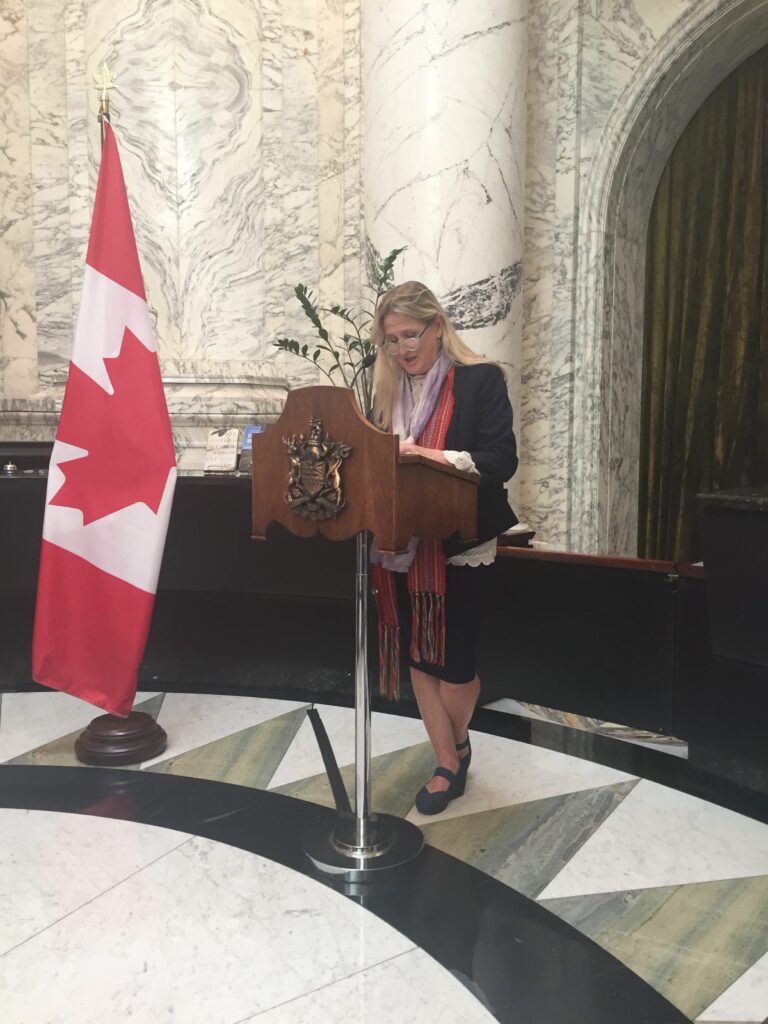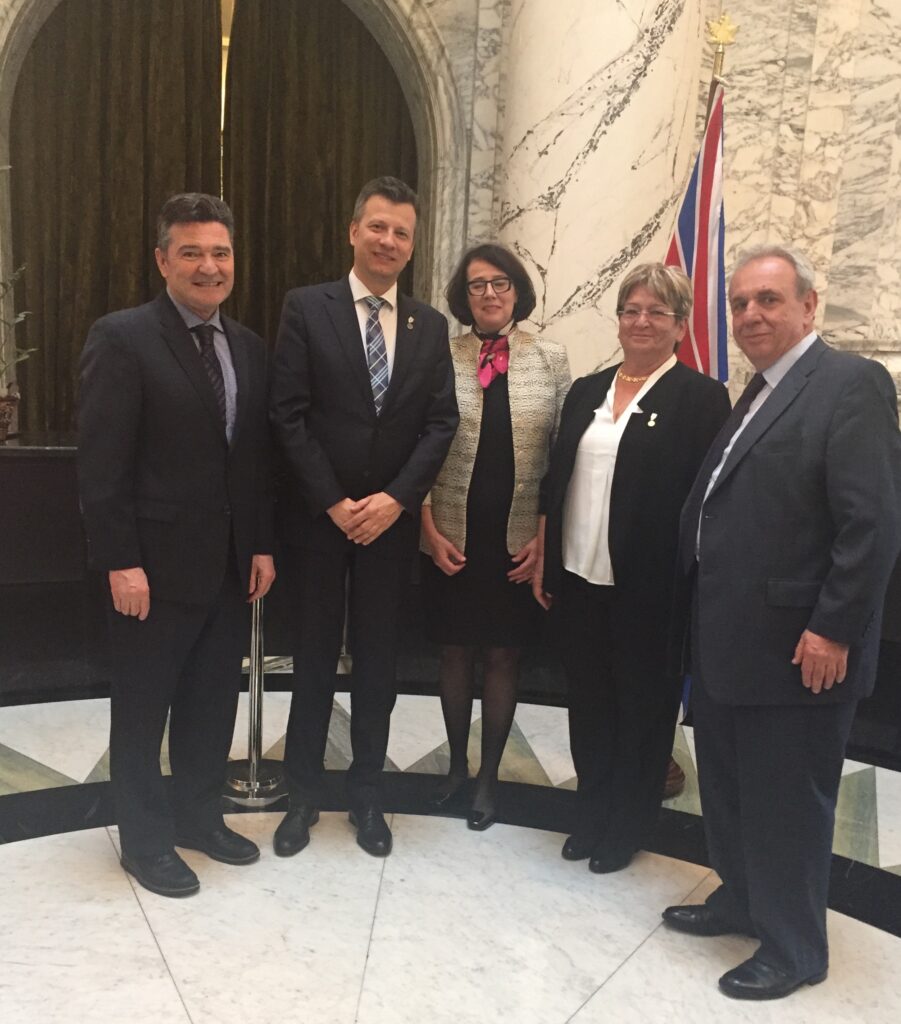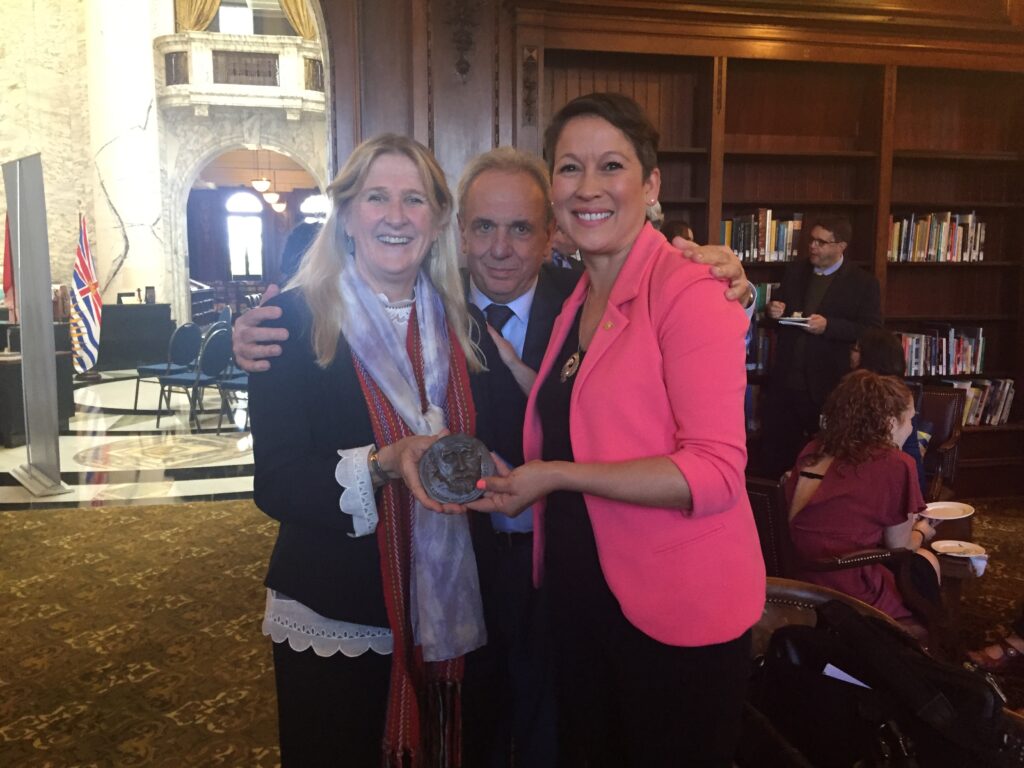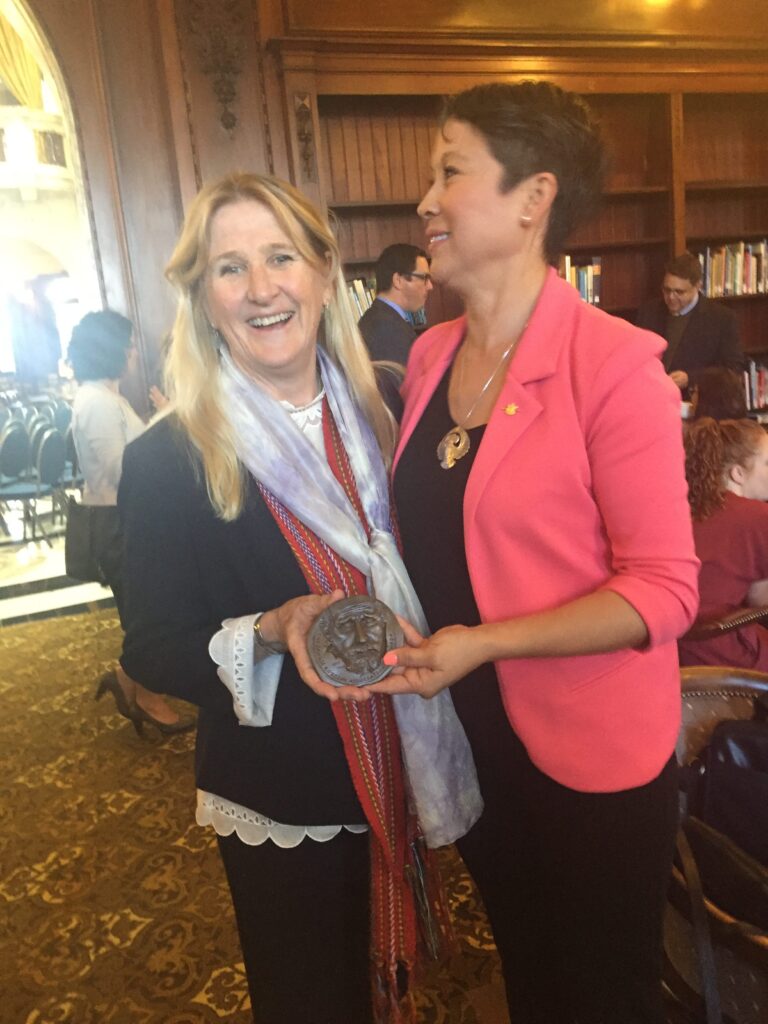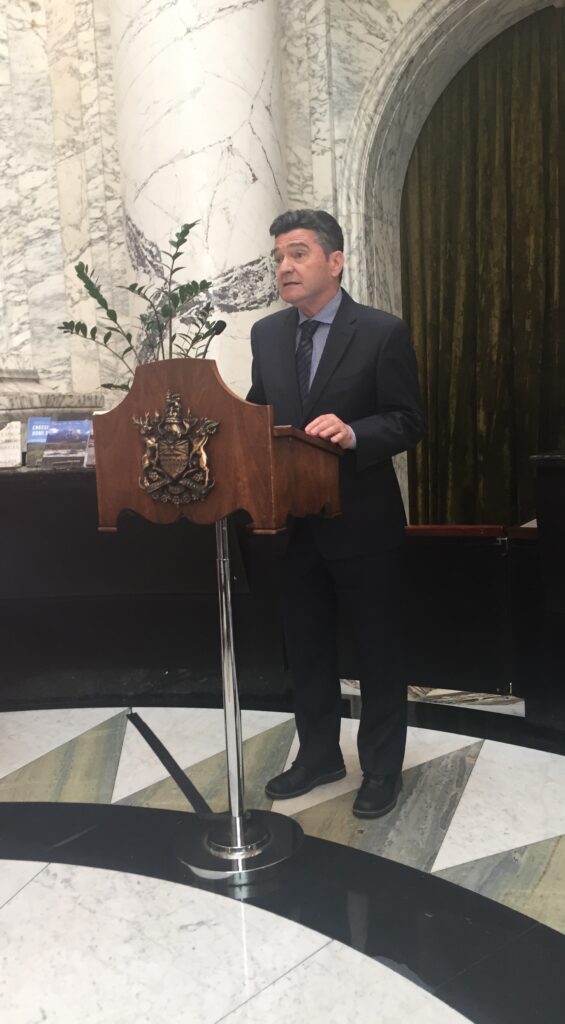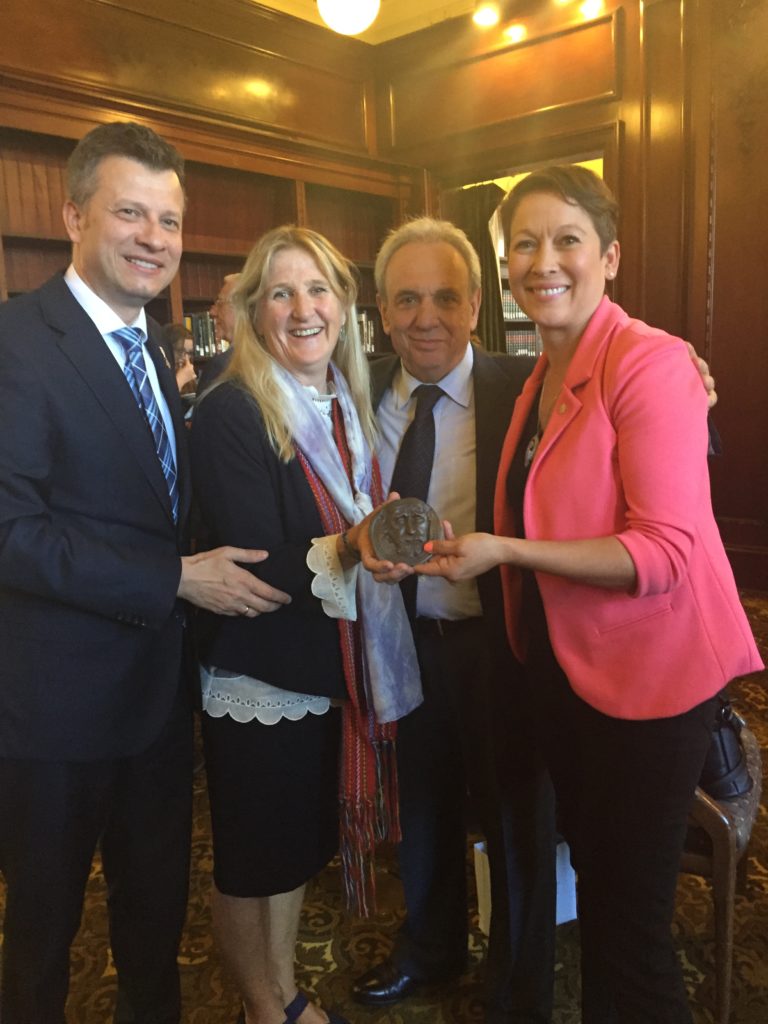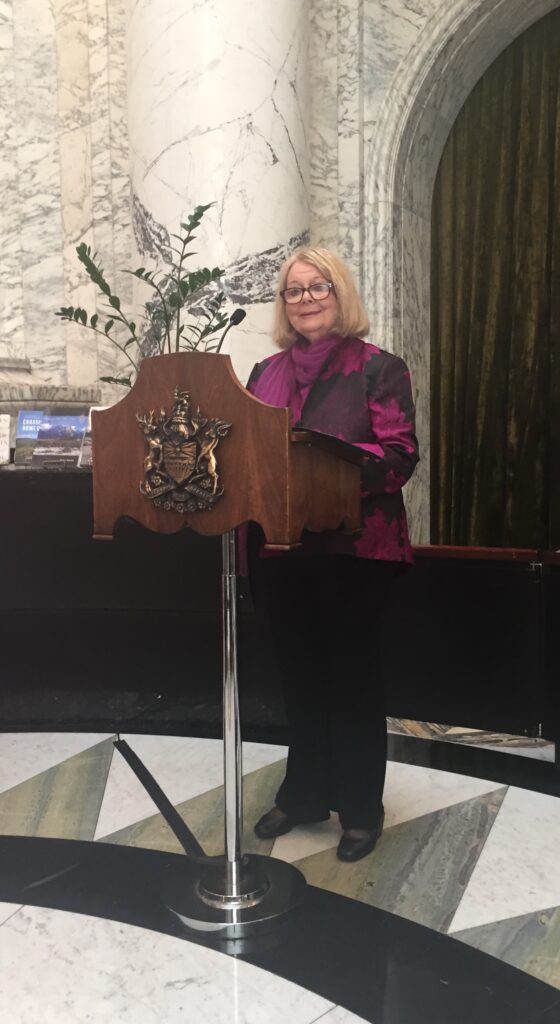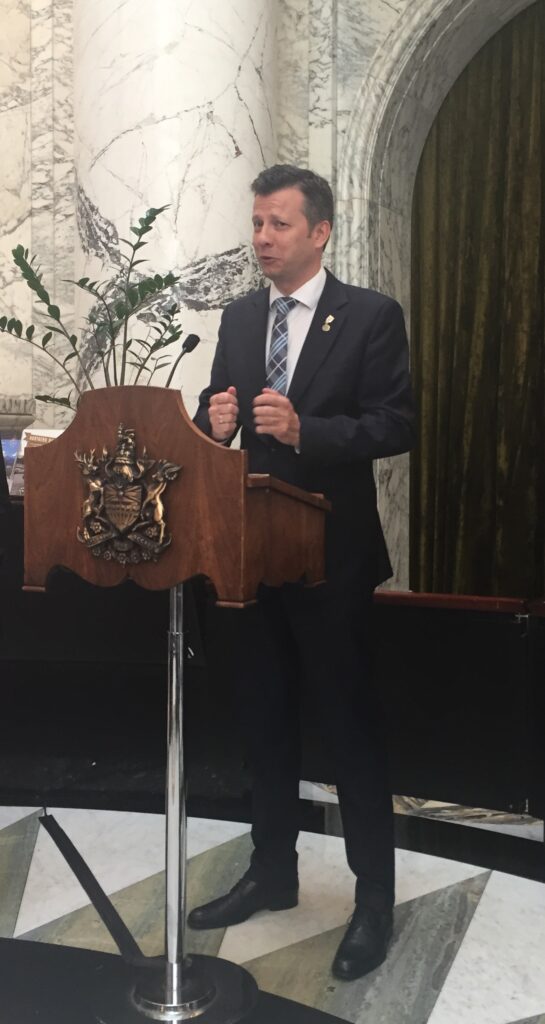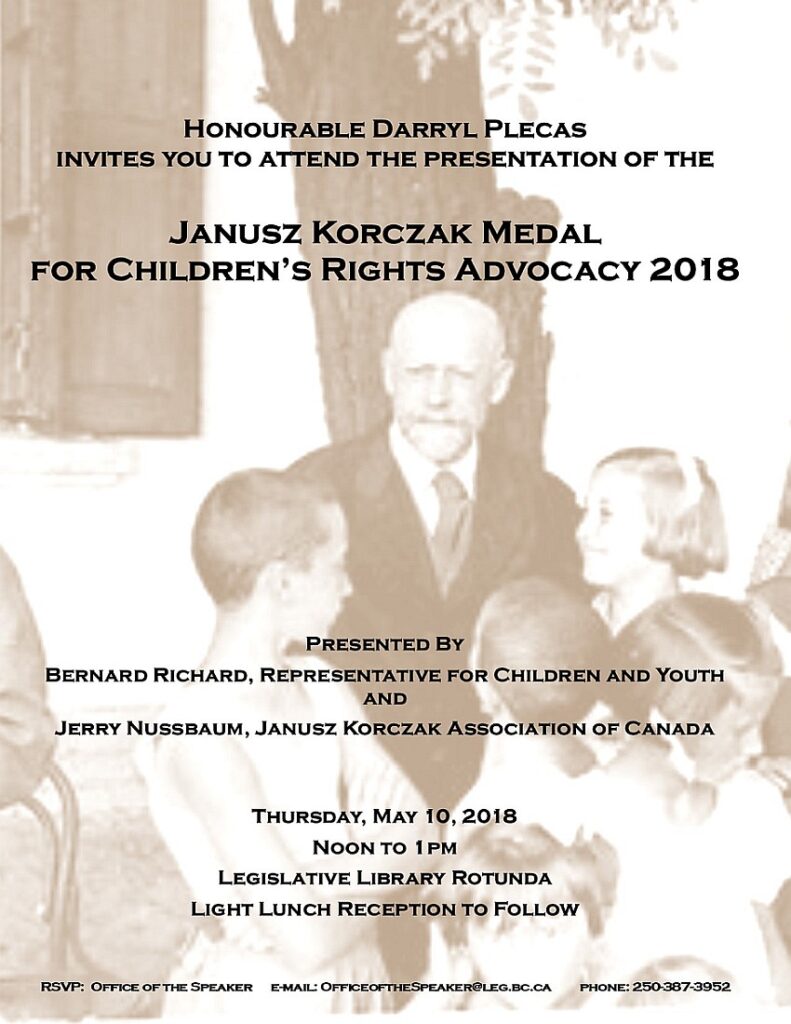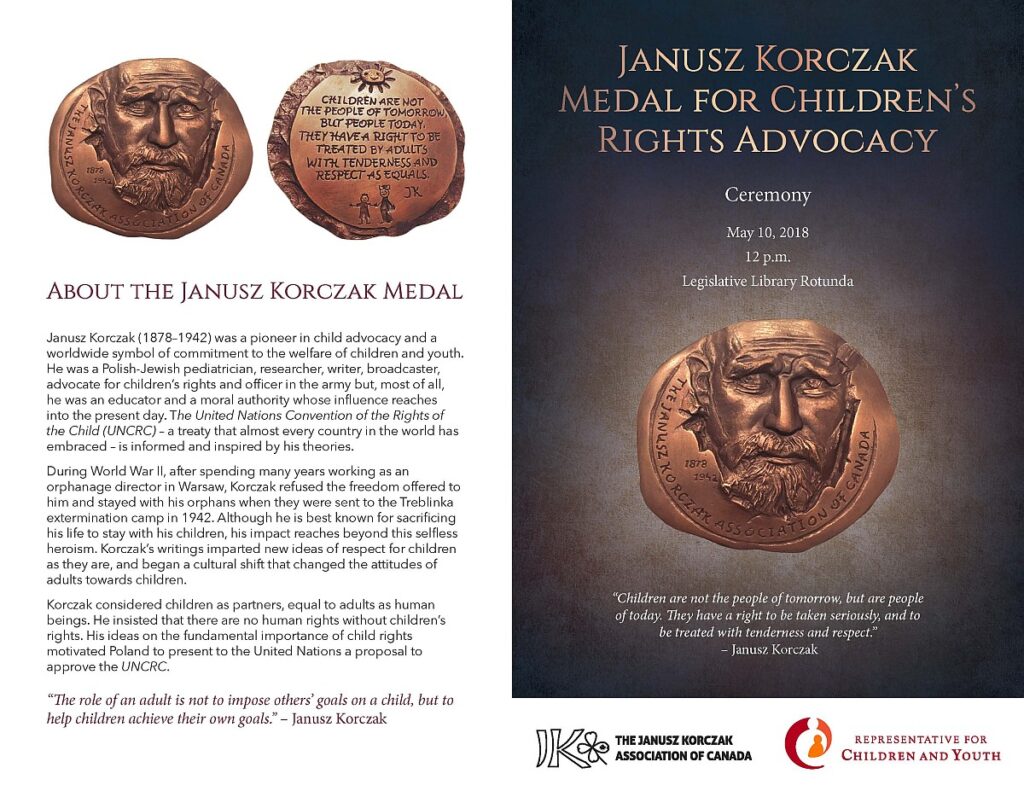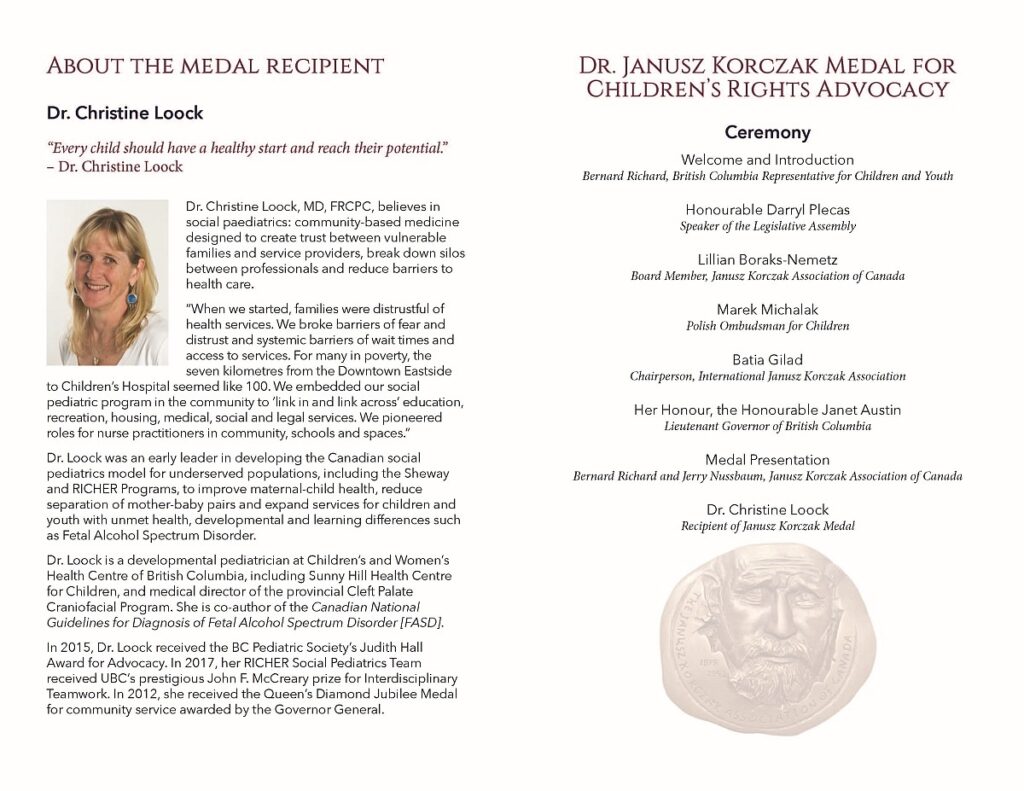Dr. Christine Loock was awarded today the third Janusz Korczak Medal for Child Advocacy. The medal is awarded jointly by the Janusz Korczak Association of Canada and the BC Representative for Children and Youth. The distinguished guests at the BC Legislature in Victoria ceremony included Her Honour, the Honourable Janet Austin, Lieutenant Governor of British Columbia, Minister Marek Michalak, the Polish Ombudsman for Children and Batia Gilad, Chairperson of the International Janusz Korczak Association, Minister of Advanced Education, Skills and Training, Hon. Melanie Mark and Minister and Minister of Children and Family Development, Hon. Katrine Conroy and the BC Representative for Children and Youth, Bernard Richard. The reception was hosted by the Honourable Darryl Plecas, the Speaker of the Legislative Assembly.

The speakers included the Her Honour Janet Austin, Minister Marek Michalak, Batia Gilad, Bernard Richard, Lillian Boraks-Nemetz, a Board member of the Janusz Korczak Association of Canada and Dr. Christine Loock, the medal recipient. The Medal was presented by Bernard Richard and Jerry Nussbaum, the President of the Janusz Korczak Association of Canada.
The News Release by the BC Representative for Children and Youth describes the ceremony at the Legislature:
DOWNTOWN EASTSIDE DOCTOR RECEIVES CHILD RIGHTS MEDAL
VICTORIA – Social pediatrician Dr. Christine Loock was today honoured with the Janusz Korczak medal for child rights advocacy for her lifetime of work with vulnerable families in Vancouver’s Downtown Eastside. The medal, awarded jointly by the Representative for Children and Youth and the Janusz Korczak Association of Canada, recognizes outstanding contributions to the promotion of child rights in the spirit of Dr. Janusz Korczak.
At a ceremony at the Legislative Buildings, dignitaries including Lieutenant Governor Janet Austin and Polish Ombudsman for Children’s Rights Marek Michalak recognized Dr. Loock for her pioneering work in social pediatrics. Representative for Children and Youth Bernard Richard and Janusz Korczak Association of Canada president Jerry Nussbaum made the presentation.
Dr. Korczak was a Polish-Jewish author and pediatrician, best known for his selfless heroism in 1942 when, as an orphanage director in Warsaw, he refused offers of freedom and accompanied the children in his care to a Nazi extermination camp.
Social pediatrics is an interprofessional, community-based model of medicine designed to create trust between vulnerable families and service providers, break down silos between professionals and reduce barriers to health care. Dr. Loock was an early leader in the field. She has been practising in the Downtown Eastside since 1989 and has led the RICHER social pediatrics program at BC Children’s Hospital since its inception in 2006.
“Social pediatrics is about who we aren’t serving,” said Loock. “It’s about fostering equity. At the start, families were distrustful of health services. By building relationships, we broke down social and systemic barriers of fear, wait times and access to services. We’re doing this with community. And that means empowering communities and families to have agency in their health. It’s about changing systems and working together.”
Dr. Loock is a developmental pediatrician at Children’s and Women’s Health Centre of British Columbia, including Sunny Hill Health Centre for Children, and medical director of the provincial Cleft Palate Craniofacial Program. She is co-author of the Canadian National Guidelines for Diagnosis of Fetal Alcohol Spectrum Disorder.
“I met Dr. Loock soon after arriving in B.C. in 2017 and was immediately inspired by her deep commitment to children and families,” said Richard, adding that he was honoured to participate in the ceremony.
“Dr. Loock’s on-the-ground advocacy embodies the spirit of Korczak,” said Nussbaum. “Her dedication over nearly 30 years of service to children is humbling, and her impact on the lives of families is immeasurable. The honour she has received today is so well-deserved.”
Media Contact:
Jeff Rud
Executive Director, Strategy and Communications
A Talk on Janusz Korczak at the Legislature Library in Victoria, BC. On May 10, 2018
By Lillian Boraks-Nemetz
On behalf of the Janusz Korczak Association of Canada .
Big welcome to Her Honor, Janet Austin, the honorable Lieutenant Governor of British Columbia
Distinguished guests
Since it is in the spirit of Korczak’s ideology that all our work is done we hope never to lose sight of his message, the core of which is:
To fight for the rights of children and their well- being.
To respect and cherish them. To acknowledge and support them.
As many of you may know by now Korczak’s entire life was devoted to children.
He was a children’s rights champion who looked after orphans, went to court to fight for them. In the times when children were supposed to be seen not heard Korczak found venues which gave children a voice… , He ran a radio program in which he encouraged young people to express their ideas, thoughts and feelings and speak freely about their problems.
He published a little review for the children by the children about children. He looked after children imprisoned in the Warsaw Ghetto during the Second World War.
His books and stories reflected his message on how to love a child that went out to society at large and recorded ideas that are still relevant in modern times. And I quote in translation from the Polish what Korczak wrote as long ago as 1933:
“What a tragedy is our contemporary life and how shameful of this generation which is passing onto its children a chaotic world . “
“This type of a world is frightening and it is a world which we cannot allow. So it should be forbidden to leave a messy world such as this to our children .”
Furthermore he writes “To repair this world one should first of all begin by repairing the well -being of its children.”
But what has changed?
Today there are many wars, terror reigns, displacement and chaos. Even in the peaceful countries children sense this though the messages on the social media . Students whom I talk to about the Holocaust often ask me how can they distill the truth from fake news?
And how will these children grow up into decent, happy and undamaged human beings in today’s world where anti-Semitism and ethnic cleansing are on the rampage again . How will being in the zones where wars rage, shape their lives?
And I know what it is like to be a war child, in the war zone, pursued, discriminated against and deprived of all human rights. I lived in the Warsaw Ghetto form 1940 t0 1942. Dr. Korczak was an old man then, I was a young child forbidden to go to school. I had to be separated from my parents in order to survive in hiding under false papers. I lost my identity as a daughter, a Jew, a child. I lost my right to live because Hitler sentenced every Jewish European child to death
I know injustice and the dire consequence of racism .
I came out of my childhood experience into adulthood derailed and confused suffering from an unhealed trauma .
After the war there were no Korczaks who would listen to us child survivors, no counselors and our parents were far too busy building new lives.
But in some way I was lucky. My Korczak was my father, who knew the old doctor and loved his ideology which my father practiced on me when he taught me that I had rights as a human being.
After the war I was also lucky to have come to Canada where we could be free and safe where I was able to pursue an education with the help of understanding teachers, find friends and make a life for myself. In this climate I was slowly able to find healing, though never completely and even that took a very long time. But I was able to regain some part of myself I had lost during the war. And I never take this for granted but am thankful every day for the gifts I have been given in this country.
My father’s stories of Korczak whom he had loved so well and what I had learned form them about kindness, empathy and love for another human being helped me get by the difficult years.
But I often wonder with horror what Dr. Korczak would think of our world today if he could see and hear the daily news?
We need people like him to soothe the suffering of children, assuage their loneliness, feelings of rejection and fear. We need to work hard to make our children understand that despite the evil there is also kindness and respect, opportunities for the betterment of their lives unhampered by prejudice, racism and hate and above all war.
There are wonderful Canadians, and people form other nations who have come aboard and are dedicated to children’s causes and involved in the process of working with children and on their behalf : the professionals, the planners, government officials ,social workers and teachers , all involved today and every day with the welfare of children.
This is progress, and I am looking at it through the eyes of one who has regained hope.
In conclusion I would like to read to you a poem, written by Richard Mirabel, a Polish poet who lived in Korczak’s time, knew him and I believe even helped him with the publication of the Little Review.
Part 4 – from In Memoriam to Janusz Korczak
by Richard Mirabel,
He is not gone
believe me
I have seen him outside those gates
Guiding his brood to an open market place
full of ripe fruits and the smell of flowers
I have found him in the smile
of one who beaten down
was lifted up by the friendly hands
of a nameless passerby
I have seen him
in his Orphan’s Home
in deep thoughts
lost
confused
alone
And you
may find him
in the forgotten love
of your fellow Man
that Every Man
The talk by Marek Michalak the Polish Ombudsman for Children
The rights of the child, or how we follow the Janusz Korczak tradition today.
We’ve come to live in difficult but exciting times, marked by huge changes in the political, economic, social and scientific arenas. We’ve experienced the fascination of technical and scientific discoveries. With our own eyes we have witnessed how the Internet has changed the perception of the world. With the Internet we are able to do so much more.
At the same time, it is becoming more evident that science, engineering, computer science and Robotics alone do not suffice. Clearly, in addition to the technological development the world needs moral values as well as respected and influential authorities to stand side by side with scholars, physicists, microbiologists, and economists. Poets, philosophers, and teachers are also needed. To put it simply, the world requires a mix of ordinary and extraordinary people. Janusz Korczak, whose birth name was Henryk Goldszmit, who has been and still is a representative of such deep moral values of the 20th century should be placed next to Mahatma Gandhi, Mother Teresa of Calcutta, Albert Schweitzer, and John Paul II.
Henryk Goldszmit was born on 22 July 1878 or 1879 in Warsaw, within the Russian partition of Poland, under Russian rule. He was educated in a boys only school where boot camp discipline and Russian-imposed laws prevailed. Years later, seemingly as means of self-therapy and a warning to others, Korczak would describe what he had gone through and observed there, and how he had survived those years of oppression, humiliation and corporal punishment. In a story named “Ill-fated Week”, he demonstrated the injustice at a school level and abuse of power by the superior class – the teachers – over the inferior class or slaves – the students. Less focused on the geopolitical situation, he concentrated more on the interpersonal relations. He specifically focused on the oppression of the weak and vulnerable, not only because of their origins, but due to their age and consequently, in these times, their lower status. He studied medicine and decided to become a pediatrician, despite the low status of “a children’s doctor”. He grew up in a wealthy home, in a comfortable environment, where there was no shortage of support, servants, or governesses, “nevertheless, in the memoirs, his childhood comes across as full of fears, tensions and a sense of shame from which he would later struggle to protect the children”. He graduated from medical school, although his dream was to become a writer. Ultimately he became an educator of Jewish orphans, the best teacher (albeit with no degree in education), a great defender of the rights of the child, and, no doubt, the first informal, independent spokesperson for the rights of the child. He devoted his entire life to children and their cause during the era of an economic and political crisis, and of anti-Semitism, which had gripped Poland during the pre-war era.
He maintained close affiliations with representatives of progressive educational circles, which included both Jews and Poles. He was disgusted by anti-Semitism, as well as vivid social divisions existent within pre-war Poland. At all times he firmly supported the poor and the weak. Over the years, he himself experienced poverty and was fully cognizant of his family’s plight, both economically and socially.
The Korczak phenomenon has been the subject of fascination by many researchers and artists, and still is to this day. Today, we understand the depth and diversity of Janusz Korczak as a person and we appreciate his outstanding contribution to the history and culture of Europe and the world.
In 1912, more than a hundred years ago, Korczak took over the leadership of the House of Orphans for Jewish children in Warsaw where Stefania Wilczyńska was appointed the house mother. Korczak moved in with the children, and this allowed him to observe them, talk and play with them, care for them, clip their nails and cut their hair. Along with everyone else he performed household chores like polishing shoes, cleaning tables, and peeling potatoes. He taught them self-reliance, self-improvement, accountability, discipline, patience and a sense of consequence for their actions. It is worth noting that his teachings involved his own demonstrations of right and wrong rather than theoretical lectures. His efforts were to detect as many good sides of each child as possible, while at the same time challenging them toward further improvement.
In 2013, together with Batia Gilad, I had the pleasure of meeting in Israel and speaking with the last surviving Korczak Children: Icchak Belfer, Szlomo Nadel and Izaak Skalka during the ceremony awarding all three of them the Order of Smile. They all reminisced that their Dad, as they used to refer to Korczak, probably never slept or rested. He was always working yet he always had time for them and, when spoken to, every child had the impression of being the centre of the world. It was Korczak’s method to fully focus his attention on his children. He was consistent and demanding, and yet full of understanding and respect for children and their needs. First and foremost, he challenged himself before challenging others.
Korczak’s philosophy has raised the worth of the child. In his most famous essay “How to love a child”, translated into multiple languages, he stated: “I petition the Magna Charta Libertatis to include laws for the rights of a child“. He also called for the child’s right to die, the right of a child to live in the present day and the right of a child to be who he/she is. Ten years later, he was speaking about the law of respect for the child. He presented these rights as challenges for parents, teachers, social workers, doctors, judges, priests, politicians, and the rest of mankind.
These laws are paramount for the Children’s Rights Ombudsman in Poland. They function as legal social guidance, as well as educational, ethical and legal protection – embodied in the Convention on the Rights of the Child, which is based on the Korczak’s ideals and experience. The Convention on the Rights of the Child, initiated and enacted by Poland, is the most important legal document to protect the rights of the child in the world.
In the interwar period, Janusz Korczak developed in Poland a concept based on the belief that the child is an autonomous person, with his/her own interests, needs and rights, and that the child is not only the subject of care and concern for his/her welfare but also that the child’s rights and wellbeing should be respected and protected by law. This concept is a fundamental principle of the Convention on the Rights of the Child, thereby included as an aspect of human rights as a whole. Consequently, the human rights of a child have become significant and important factors under the Convention and have been dealt with as independent issues of a social, moral and legal nature. In my opinion, it is one of the most relevant ideas of the past century which is currently present in almost all fields of human activity.
There is no doubt that the Convention has become a source of inspiration and has significantly influenced a range of actions taken in order to improve the situation of children around the world. The Convention on the rights of the child, of course, is not and cannot be treated as panacea or remedy for all the injuries or mistreatment affecting children in the modern world. It should however be considered as the international agreement with long-term impact. Furthermore, it is empowered to effectively oversee activities of various nations and its target is to rectify the situation of children in the 21st century around the world.
In this day and age, we observe quick transformations of moral behaviors, which indicate the increasing complexity of social interactions. Unfortunately more and more often children fall victim to these complex changes, as indicated by the growing number of conflicts involving children. This includes matters on an international scale, such as the provision of health care, means of sustenance, violence, kidnapping and intricate matters related to property ownership. A great concern is the lack of effective action taken in defense of children, who are victims of armed conflicts, genocide, or ethnic cleansing. Regrettably, in many parts of the world children are still the subject of trade, economic and sexual exploitation.
The types and scale of children’s problems have caused the protection of children’s rights internationally to became heavily exposed to the forum of the United Nations. And so the proposal submitted by the Polish Ombudsman on the rights of the child was to equip the Committee on the Rights of the Child to receive and process individual complaints. As a result of these efforts the United Nations General Assembly in December 2011, approved additional protocols to the Convention on the Rights of the Child outlining procedures for the complaints board.
In light of this, it should be strongly noted that the Convention is a living instrument and may not be treated as the last stage in the development of the rights of the child and their protection. The Convention also does not contain a comprehensive catalogue of the rights of the child, which are continuously developed. The Convention on the Rights of the Child is a versatile instrument not only to protect those rights, but to make adults recognize the value of their own childhood, and thus the humanity in the process of peaceful and friendly coexistence. It is safe to say that the more followers of the provisions of the Convention, the less harm would come to people, and thus there would be fewer conflicts and threats, which too often are linked with massive and drastic violations of human rights.
I strongly believe that the thoughts and ideas of Janusz Korczak will become a lesson for us all: a moment of contemplation about the rights of children, the condemnation of all crimes, violence and exploitation of children and that we should better grasp the meaning of what he had once said: “Childhood years are real life, and not merely a preamble.”
Irena Sendler, a great Polish heroine, was fascinated by Janusz Korczak and his teachings. She contributed to the rescue of more than 2500 Jewish children by bringing them from the Warsaw ghetto personally or by an organized network of people dedicated to the cause. This year marks a decade since her death. The Polish Parliament, at the request of the Ombudsman for Children’s Rights, announced the year 2018 to be dedicated to the memory of Irena Sendler.
The rights of the child are a mutual responsibility of those who govern, watch, and research children, as well as non-governmental activists, teachers and educators. It is our shared duty to fight for children’s rights so as not to face the dilemma once expressed by Irena Sendler, who in 2007 was awarded the Order of Smile by children. Her strong words were: “And what about the world, Mighty nations? The world was silent! And the silence sometimes means allowing bad things to happen “.
